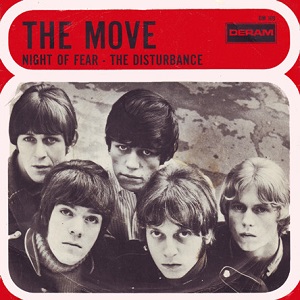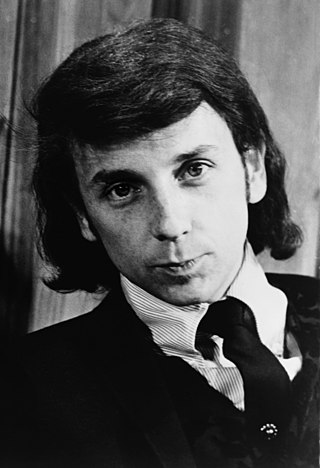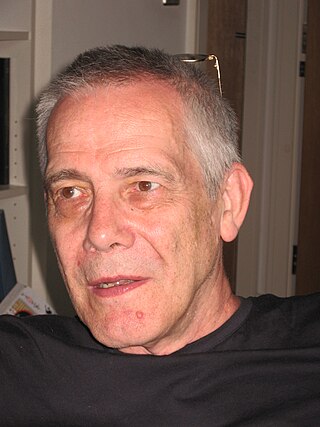Punk rock is a music genre that emerged in the mid-1970s. Rooted in 1950s rock and roll and 1960s garage rock, punk bands rejected the corporate nature of mainstream 1970s rock music. They typically produced short, fast-paced songs with hard-edged melodies and singing styles with stripped-down instrumentation. Lyricism in punk typically revolves around anti-establishment and anti-authoritarian themes. Punk embraces a DIY ethic; many bands self-produce recordings and distribute them through independent labels.
Beat music, British beat, or Merseybeat is a British popular music genre that developed, particularly in and around Liverpool, in the late 1950s and early 1960s. The genre melded influences from British and American rock and roll, rhythm and blues, skiffle, traditional pop and music hall. It rose to mainstream popularity in the UK and Europe by 1963 before spreading to North America in 1964 with the British Invasion. The beat style had a significant impact on popular music and youth culture, from 1960s movements such as garage rock, folk rock and psychedelic music.

Robert Thomas Christgau is an American music journalist and essayist. Among the most well-known and influential music critics, he began his career in the late 1960s as one of the earliest professional rock critics and later became an early proponent of musical movements such as hip hop, riot grrrl, and the import of African popular music in the West. He was the chief music critic and senior editor for The Village Voice for 37 years, during which time he created and oversaw the annual Pazz & Jop critics poll. He has also covered popular music for Esquire, Creem, Newsday, Playboy, Rolling Stone, Billboard, NPR, Blender, and MSN Music; he was a visiting arts teacher at New York University. CNN senior writer Jamie Allen has called Christgau "the E. F. Hutton of the music world–when he talks, people listen."

The Wire is a British music magazine publishing out of London, which has been issued monthly in print since 1982. Its website launched in 1997, and an online archive of its entire back catalog became available to subscribers in 2013. Since 1985, the magazine's annual year-in-review issue, Rewind, has named an album or release of the year based on critics' ballots.

David Hepworth is a British music journalist, writer, television presenter, and publishing industry analyst. He was instrumental in the foundation of a number of popular magazines in the 1980s, 1990s and 2000s. Along with the journalist, editor and broadcaster Mark Ellen, he turned the pop magazine Smash Hits into one of the most popular UK music magazines of the 1980s. A presenter of The Old Grey Whistle Test in the 1980s, he co-presented the BBC broadcast of Live Aid in 1985.
Phillip Carden Thornalley is an English songwriter, musician, and producer who has worked in the music industry since 1978. He produced the album Pornography by The Cure and was later their bass player. He began releasing his own music in 1988 and briefly joined the band Johnny Hates Jazz. In later years he worked principally as a songwriter, and is perhaps best known for co-writing the song "Torn" and for writing two UK number one hits for Pixie Lott. Starting in the 2010s he released more solo music under his own name and as Astral Drive.

Bob Stanley is a British musician, journalist, author, and film producer. He is a member of the indie pop group Saint Etienne and has had a parallel career as a music journalist and author, writing for NME, Melody Maker, Mojo, The Guardian and The Times, as well as writing several books on music and football. His second publication, Yeah! Yeah! Yeah!: The Story of Modern Pop, was published by Faber & Faber in 2013. His third publication Let's Do It: The Birth of Pop Music: A History was published by Pegasus in 2022. He also has a career as a DJ and as a producer of record labels, and has collaborated on a series of films about London.

Kenneth Charles Howard was an English songwriter, lyricist, author and television director.

Denis Hegarty is an Irish rock and roll, doo-wop and a cappella singer, television presenter, and psychology lecturer.

"Night of Fear" is the debut single by British rock band the Move, written by Roy Wood. The song was first released on 9 December 1966, and reached number 2 in the UK Singles Chart on 26 January 1967, staying for ten weeks in the charts. "Night of Fear" was the first of a string of four consecutive top-five singles in the UK.
Philippe George "Phil" 'Hardy was an English film and music industry journalist.
Alan Tudor Blaikley was an English songwriter and composer, best known for writing a series of international hits in the 1960s and 1970s in collaboration with Ken Howard, including the UK number ones "Have I the Right?" and "The Legend of Xanadu". Together with Howard, he also wrote two West End musicals and a number of TV themes, including the theme music for the BBC's long-running series of Agatha Christie's Miss Marple.

Harvey Phillip Spector was an American record producer and songwriter. He is best known for his innovative recording practices and entrepreneurship in the 1960s along with his two trials and conviction for the murder of Lana Clarkson in the 2000s. Spector developed the Wall of Sound, a production style that is characterized for its diffusion of tone colors and dense orchestral sound, which he described as a "Wagnerian" approach to rock and roll. He is widely regarded as one of the most influential figures in pop music history and one of the most successful producers of the 1960s.
Let It Rock was a monthly British music magazine, which featured lengthy critical articles, record reviews, and feature articles covering a wide spectrum of popular music, including soul, reggae, and blues. Between October 1972 and December 1975, 35 issues of the magazine were published in London, by Hanover Books, sometime in Berners Street W1. The publisher was Peter Shepherd, who also published other music publications including Folk Review and Country Music. Dave Laing was the founding editor; John Pidgeon took over as editor in October 1973. The reviews editor was Simon Frith, and Charlie Gillett was consultant editor. Other contributors included John Peel, Lester Bangs, Michael Gray, Mick Gold, Mick Houghton, David Downing, Gary Herman, Idris Walters, Karl Dallas, Ian Hoare and Phil Hardy, and the soul music column was written by Pete Wingfield. The initial art editor was John Finn. Designers and illustrators included Barney Bubbles, George Snow, Kevin Sparrow and Peter Till. The magazine struggled to achieve consistent sales of 20,000 and closed due to market forces. Music writers David Hepworth and Barney Hoskyns have called Let It Rock influential, and suggested that it was the precursor of such music publications as Q magazine and Mojo.

Hearts and Flowers is the twelfth studio album by British singer-songwriter Joan Armatrading. The album was written, arranged and produced by Armatrading; recorded at Bumpkin Studios, her own studios in the grounds of her home; mixed at The Grey Room in Los Angeles and mastered at Sterling Sound, New York. Armatrading began writing the album in 1989 and finished it in April 1990. It was released on 4 June 1990 by A&M Records.

Philip Tagg was a British musicologist, writer and educator. He was co-founder of the International Association for the Study of Popular Music (IASPM) and author of several influential books on popular music and music semiotics.

Christgau's Record Guide: Rock Albums of the Seventies is a music reference book by American music journalist and essayist Robert Christgau. It was first published in October 1981 by Ticknor & Fields. The book compiles approximately 3,000 of Christgau's capsule album reviews, most of which were originally written for his "Consumer Guide" column in The Village Voice throughout the 1970s. The entries feature annotated details about each record's release and cover a variety of genres related to rock music.
Peter Langley Jones was a British journalist, author, editor, promoter and presenter who wrote mainly on show business matters, especially pop music, for magazines including Record Mirror and Billboard. He was involved in the early careers of both The Rolling Stones and The Beatles, pseudonymously writing the first book-length biographies of both bands.

Women in rock describes the role of women singers, instrumentalists, record producers and other music professionals in rock music and popular music and the many subgenres and hybrid genres that have emerged from these genres. Women have a high prominence in many popular music styles as singers. However, professional women instrumentalists are uncommon in popular music, especially in rock genres such as heavy metal. "[P]laying in a band is largely a male homosocial activity, that is, learning to play in a band is largely a peer-based... experience, shaped by existing sex-segregated friendship networks. As well, rock music "...is often defined as a form of male rebellion vis-à-vis female bedroom culture."
Anthony Austin O'Grady was an Australian writer, music journalist, editor and producer. He created and edited Rock Australia Magazine from 1975 to 1981. He wrote articles for The Bulletin. In 1994 O'Grady co-created the Music Network. For 15 years he was an oral history interviewer for National Film and Sound Archive (NFSA). O'Grady authored the 2001 biography Cold Chisel: The Pure Stuff detailing the Australian band Cold Chisel.












